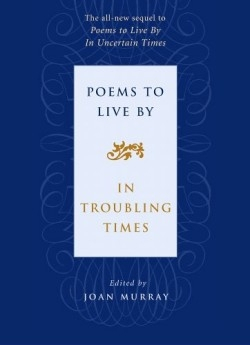Poems to Live By in Troubling Times
“Poetry is nearer to vital truth than history,” wrote Plato. This collection goes to the heart of vital human truth, exposes the raw ventricles there, and sends that heart pounding the reader into restorative action.
This volume follows the editor’s previous collection, Poems to Live by in Uncertain Times. Now one of the publisher’s best sellers, it grew out of listener response to Murray’s reading of her poem “Survivors Found” on National Public Radio shortly after 9/11. For years, she writes, she’d gathered “necessary” poems that “challenge me and comfort me, they alarm me and encourage me, they rouse my anger and stir my hope. That’s why I need them.”
As the times shifted from “uncertain” to “troubling,” Murray assembled another group of works, by poets ranging from the celebrated and beloved like Rita Dove and e.e. cummings to the lesser-known, like Nazim Hikmet, who wrote in Turkish: “I mean, you must take living so seriously / that even at seventy, for example, you’ll plant olive trees— / and not for your children, either, / but because although you fear death you don’t believe it, / because living, I mean, weighs heavier.”
These poems weigh heavy. They meditate on human conflict, and strengthen the souls that would end it. They rarely comfort. Even the poems that start out offering solace wind up back in darkness, challenging readers to get up, go out, and make light in the world. “The Sun,” by Mary Oliver, begins, “Have you ever seen / anything / in your life / more wonderful // than the way the sun, / every evening, / relaxed and easy, / floats toward the horizon” and ends, “or have you too / gone crazy / for power, / for things?”
Murray’s poems have appeared in The Atlantic Monthly, Harper’s, Ms., and other publications. A National Poetry Series Open Competition winner, she has authored two volumes of poetry, Dancing on the Edge and Looking for the Parade, and a novel in verse, Queen of the Mist, and edited The Best of Pushcart Poetry. Her collection here is arrow-accurate, grave yet hopeful.
“—When They Sleep” by Rolf Jacobsen (translated from the Norwegian) offers a hopeful prayer: “All people are children when they sleep. / There’s no war in them then. / They open their hands and breath / in that quiet rhythm heaven has given them. […] —God, teach me the language of sleep.”
The times are troubling, this collection admits, but these poems offer solid spiritual nourishment for those who strive to make the world a better place. Shu Ting’s perfect poem, “Perhaps…” (translated from the Chinese), acknowledges that human efforts might be futile, but “Perhaps when we sing praises to the sun / the sun will praise us in return / […] Perhaps / Because of our irresistible sense of mission / We have no choice.”
Disclosure: This article is not an endorsement, but a review. The publisher of this book provided free copies of the book to have their book reviewed by a professional reviewer. No fee was paid by the publisher for this review. Foreword Reviews only recommends books that we love. Foreword Magazine, Inc. is disclosing this in accordance with the Federal Trade Commission’s 16 CFR, Part 255.

